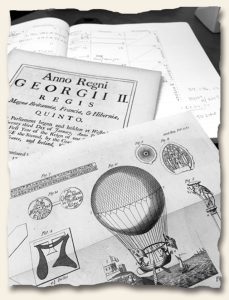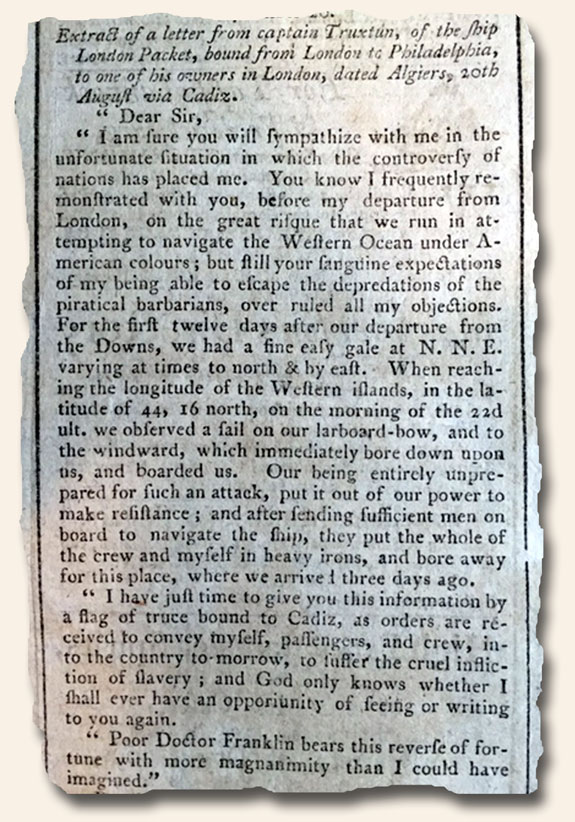Some comic relief should be found in every collection… Early parachute attempt in 1785…
November 13, 2023 by TimHughes · Leave a Comment
There seems to be a preponderance of tragic, dismal events that dominate our collections. After all, they tend to be very historic and life-altering. Think of all the “great” wars, various assassinations, the Titanic, Lusitania, & Hindenburg, and so much more.
So the occasional report with comic overtones can be refreshing. I recently wrote up an issue of the London Chronicle, July 14, 1785, with American content, but it also contains on the back page a very early parachute demonstration that went awry.
The report concerning a man who scheduled a parachute demonstration at the Blanchard Aerostatic Academy in England, planning to: “…let himself down from a prodigious altitude, and to manifest his composure by playing on a violin during his descent. To fulfill these promises, the ingenious operator had provided machinery, by which he might have been raised about 45 feet!
When the time arrived, he, with his Cremona [high-quality violin], entered the vehicle, and was raised with infinite precaution…”.
Okay, read the article to see how it plays out.
I’m New Here: Week Twenty-Nine… a.k.a. Peter Pan and the House of Lords
September 5, 2019 by Stephanie Williams · Leave a Comment
 I can find no connection between my two items of interest for this week, except they were both published in the 1700’s. Consequently, I’ll provide a separate space for each, and invite a bit of interaction from any potential readers out there – proposing some sort of link between disparate finds.
I can find no connection between my two items of interest for this week, except they were both published in the 1700’s. Consequently, I’ll provide a separate space for each, and invite a bit of interaction from any potential readers out there – proposing some sort of link between disparate finds.
My first encounter was prompted by a question from a purchaser wanting to know how much content was in the Account of Peter the Wild Boy highlighted within “The Gentleman’s Magazine” of February, 1785. I have a high degree of appreciation for the GM’s, and I particularly enjoy the questions/quests that require me to read a bit of the impressive material that passes through my fingertips. It felt enough like shirking that I offered an audible comment to the general vicinity, “So-and-so wants me to check the article length,” but it is legitimately in my job description.
At any rate, this 1782 report was three columns long, and led to my current conjecture that J.M. Barrie somehow had access to it as the inspiration for Neverland’s perpetually young ruler. Within the description by Lord Monboddo are the two sentences that utterly convinced me. “He is but low of stature, not exceeding five feet three inches; and …has a fresh healthy look. His face is not at all ugly or disagreeable; and he has a look that may be called sensible and sagacious for a savage.” Surely this is the Lost Boy, Peter Pan!
Then, in an unrelated moment, I processed an order for five of the “Acts of Parliament”. I felt confident that I could pull this portion from one of the more obscure locations, having sat down on the floor to look through these just a few weeks ago. It’s a bit challenging to become acclimated to the outmoded spelling, particularly when it’s obscured by calligraphy type, but persistence uncovers some true gems. The Act “for the further Qualification of Justices of the Peace” claims “That no Attorney, Solicitor, or Proctor(?), in any Court whatsoever, shall, from and after the said Twenty fifth Day of March, One thousand seven hundred and thirty three, be capable to continue to be a Justice of the Peace, within any County for that part of Great Britain called England, or the Principality of Wales…” Which might sound enlightened for the time, until the second to last paragraph which reads, “Provided always, That nothing in this Act contained shall extend to incapacitate any Peer or Lord of Parliament, or the elder Son or heir apparent of any Peer or Lord of Parliament, or of any Person qualified to serve as Knight of a Shire …”.
And, with that, the Middle Ages shadows this august body more than I anticipated from my modern perch. Throughout random samplings of the Acts, this juxtaposition continues in the strange mix of rote tradition and civilized advancement, reflecting sessions that directly impact worldwide legal systems of today.
And I knew where to find them. 🙂
Don’t believe everything you read…
April 21, 2016 by TimHughes · Leave a Comment
 The Pennsylvania Packet issue of November 22, 1785 contains a curious report which puzzled me, for although admitting my knowledge of American history is far from where it should be, I do not recall reading of Ben Franklin being captured by Barbary pirates upon his return from France as Ambassador.
The Pennsylvania Packet issue of November 22, 1785 contains a curious report which puzzled me, for although admitting my knowledge of American history is far from where it should be, I do not recall reading of Ben Franklin being captured by Barbary pirates upon his return from France as Ambassador.
Page 2 of this newspaper has a letter from Captain Thomas Truxtun, later of Constellation fame, dated August 20, 1785 from Algiers–with Ben Franklin as a passenger no less–mentions an encounter with Barbary pirates: “…Our being entirely unprepared for such an attack, put it out of our power to make resistance, & after sending sufficient men on board to navigate the ship they put the whole of the crew and myself in heavy irons & bore away for this place…to suffer the cruel infliction of slavery, and God only know whether I shall ever have an opportunity of seeing or writing to you again. Poor Doctor Franklin bears this reverse of fortune with more magnanimity than I could have imagined.”
Ben Franklin taken away in irons? Really??
I turned to our friend/long-term customer/naval expert George Emery for some explanation of this report. He relates that in Eugene Ferguson’s biography of Trustun, “Truxtun of the Constellation” (1956) he mentions this rumor while explaining Truxtun’s decision to arm the London Packet (to be renamed the Canton) for a forthcoming voyage to China. And the source of this rumor was this very newspaper: the Pa. Packet of Nov. 22, 1785. Apparently some enterprising reporter, “confusing ” Truxtun’s reasoning for arming the Canton to rewrite the “future” as a scary & perilous event of the past, all–perhaps–to sell more copies of the newspaper. Or perhaps Truxtun himself was responsible for this letter’s presence in the Pennsylvania Packet to bolster support for arming American merchant vessels then sailing to Europe, and particularly the Mediterranean.
Ferguson goes on to mention in his book: “…while he was yet bringing Franklin home during the last voyage, it was rumored in London that Captain Truxtun’s ship had been captured by the Barbary corsairs and that all aboard, including the great Franklin, were consigned to slavery in Algiers…”.
The capture never happened.


